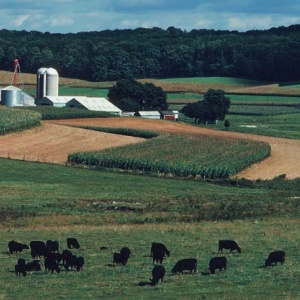
This paper discusses the water-energy-food nexus from a UK perspective with a focus on competing land demands. The research, led by the Tyndall Centre for Climate Change Research, suggests that current UK policies on water, energy and food are too fragmented to effectively tackle global challenges. The paper argues that there is a need for cross-sectoral policies and for new research to focus on the nexus between sectors, scales and timeframes to address this challenge.
The authors propose a new modelling framework to reconcile competing demands for resources and argue that ecosystems services have to be viewed and valued as a whole, across different sectors and that non-monetary constraints on the use of some ecosystem services need to be introduced if we are to create resilient land-use at the nexus. It is advisable to look at wider societal benefits and not just create a simple monetary evaluation. An inclusive assessment of several ecosystem services (such as energy and water), in addition to agricultural products, has also been shown to increases the value of land.
Most UK policies analysed barely acknowledge interactions with the other sectors. In a commentary to the paper the authors write that “interestingly, the food element of the nexus is not covered by any comprehensive legislation – instead it is partly considered by agricultural policies and nutritional guidelines. Yet, there is little integration between, for example, recommended diets and the policies on growing plants and animals, or between agriculture and forestry”. In terms of timescales, the paper also highlights water-food-energy nexus impacts on inter-generational justice, between the present and future generations. By exhausting resources at a faster rate than they can be replenished (such as soil fertility and clean water) and by not mitigating climate change, the current generation is robbing future generations of the ‘ecosystem services’ it has itself enjoyed.
Abstract
As nations develop policies for low-carbon transitions, conflicts with existing policies and planning tools are leading to competing demands for land and other resources. This raises fundamental questions over how multiple demands can best be managed. Taking the UK as an empirical example, this paper critiques current policies and practices to explore the interdependencies at the water-energy-food nexus. It considers how current land uses and related policies affect the UK’s resilience to climate change, setting out an agenda for research and practice relevant to stakeholders in land-use management, policy and modelling. Despite recent progress in recognising such nexus challenges, most UK land-related policies and associated science continue to be compartmentalised by both scale and sector and seldom acknowledge nexus interconnections. On a temporal level, the absence of an over-arching strategy leaves inter-generational trade-offs poorly considered. Given the system lock-in and the lengthy policy-making process, it is essential to develop alternative ways of providing dynamic, flexible, practical and scientifically robust decision support for policy-makers. A range of ecosystem services need to be valued and integrated into a resilient land-use strategy, including the introduction of non-monetary, physical-unit constraints on the use of particular services.
Citation
Sharminaa, M., Hoolohan, C., Bows-Larkin, A., Burgess, P. J., Colwill, J., Gilbert, P., Howard, D., Knox, J., Anderson K., (2016) A nexus perspective on competing land demands: Wider lessons from a UK policy case study, Environmental Science & Policy, Vol. 59, doi:10.1016/j.envsci.2016.02.008
Read the full paper open access here. You can also see a commentary on the research from the authors on LSE policy blogs.
You can read more in the research library categories on the issue category land, the nexus, land use and land use change, the issue category governance and policy as well as its keyword category land governance.












Post a new comment »